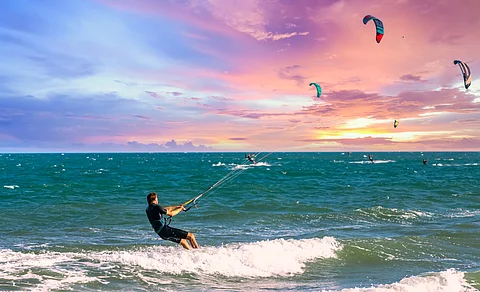
- Destinations
- Experiences
- Stay
- What's new
- Editor’s Picks
- Responsible Tourism
- CampaignsCampaigns
- Subscribe

There is something for everyone in Vietnam's surfing scene, from wide beaches that welcome beginners to secret bays with big breaks for the experienced. Vietnam has steadily become a popular destination for surfers due to its expansive beaches, diverse climate, and lively surf culture. If you're planning a Vietnam trip, here's your guide to the best places to ride the waves.
Mui Ne, which is in southeast Vietnam, is often mentioned as the nation's top surfing and water sports destination. Because of its steady waves and warm weather, surfers from all over the world come to this lively beach town. The main beach in Mui Ne, which runs along the South China Sea, is best for surfing from November to March, when the winds create waves that are suitable for both novice and expert surfers.
Mui Ne is a great place for surf sessions because of its shallow coasts and sandy beaches. You may simply rent equipment or receive professional instruction from a number of surf schools. Mui Ne is a multifaceted location for thrill-seekers, offering kitesurfing, windsurfing, and paddleboarding in addition to surfing.
Da Nang is a bustling coastal city in central Vietnam that is well-known for its stunning beaches, mouthwatering seafood, and exciting nightlife. Da Nang's top surfing spot is My Khe Beach, which locals refer to as "China Beach." My Khe is particularly suitable for novices due to its clear waters and steady waves. With waves averaging three to six feet, September through March is the finest time of year to surf here. These waves provide the perfect setting for both simple rides and more strenuous sessions occasionally.
Da Nang's surf community is friendly and close-knit, with a number of surf shops and schools providing reasonably priced lessons and rentals. While more experienced surfers can tackle larger swells at the busiest time of year, beginners will find mild waves in the early morning. If surfing is new to you, consider starting with a sunrise session for calmer waters and spectacular views.
Nha Trang, which lies farther down the coast, is a well-liked destination for both locals and visitors because it blends metropolitan energy with a luxurious beach resort atmosphere. Nha Trang has a limited surf season (November to March), but its mild waters and seaside facilities make it a desirable destination. The best place to surf in Nha Trang is Bai Dai Beach, which is roughly 25 kilometres from the city centre. Beginner surfers wishing to hone their skills in a laid-back setting will find Bai Dai's soft sand and mild waves to be perfect.
There are numerous surf schools in the region that provide instruction and board rentals. Although the waves in Nha Trang may be gentle for experienced surfers, its serene surroundings and crystal-clear waters make it a great place for anyone wishing to learn or have fun.
Situated approximately 100 kilometres from Ho Chi Minh City, Vung Tau is a popular weekend getaway spot for locals due to its vibrant beaches and relaxed atmosphere. From December to March, Vung Tau offers steady, beginner-friendly waves that make for superb surfing conditions. The primary surfing beach in this area is Back Beach (Bai Sau), which has waves that often range from two to four feet.
Vung Tau is a convenient option for short visits due to its proximity to the city and numerous surf schools and rental stores in the area. Since local surfers eager to exchange advice and ideas visit it, it's also an excellent place to get a taste of the local Vietnamese surf culture.
One of Vietnam's lesser-known but growing surf scenes is in Phan Rang, between Nha Trang and Mui Ne. Phan Rang is a great option for those looking for tranquillity and more challenging waves because of its consistent swells and empty beaches. This area is better suited for intermediate and expert surfers because the waves might be larger and stronger than those in Mui Ne or Nha Trang.
Although there are some excellent surf places all year round, November through March is the ideal time of year to surf in Phan Rang. The adjacent Nui Chua National Park, with its stunning scenery and distinct coastline rock formations offering a tranquil surfing backdrop, adds to the allure. Since Phan Rang is still growing as a surfing destination, bring your own board if possible, as rentals might be limited.
Observing local beach regulations and surf etiquette when surfing in Vietnam is crucial. Although most locals are hospitable and kind to visitors, being respectful and patient goes a long way. An effective way to interact with locals is to learn a few Vietnamese words, such as "Xin chào" (hello) and "Cảm ơn" (thank you). It is strongly advised that you take a few lessons if you are new to surfing in order to learn the fundamentals and advance your abilities.
Board rentals are available on most beaches, but it's best to pack your own equipment if you go to more isolated locations like Phan Rang or Con Dao. Additionally, remember to pack sunscreen because Vietnam's tropical heat is intense all year round.
